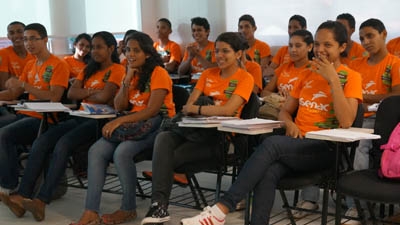Challenge
Despite substantial gains over the last decade, poverty in Brazil remains high, and more than one person out of five lives below the poverty line. According to the National Institute of Applied Economics Research (IPEA), extreme poverty reached 7.3% in 2009, down from 15.2% in 2003; while moderate poverty declined to 21.4% from 35.8%. Despite these impressive gains, there are still a large numbers of people who remain poor in monetary terms and who lack access to basic services. Reaching these people, and more importantly, establishing the conditions for their productive inclusion into the Brazilian economy, remains a challenge.
Solution
The Brazilian Government committed itself to lifting 16 million people from poverty through a three-pronged approach that included a productive inclusion component promoting activities in rural and urban areas, and aimed at increasing the productivity of families in extreme poverty towards employment and income generation.
The World Bank and the Brazilian Government designed the Productive Inclusion within Brasil Sem Miseria non-lending technical assistance program focused on three areas:
- Support the Ministry of Social Development (MDS) in organizing a workshop on urban productive inclusion.
- Deepen the knowledge on rural productive inclusion, especially by sharing the Bank’s experience in this area.
- Facilitate the discussion for a north-south exchange on the implementation challenges of social protection programs in metropolitan areas (Rio de Janeiro, Sao Paulo and New York), with a particular emphasis on the articulation of productive inclusion programs within the social protection system.
Results
This technical assistance was strategic and effective in providing valuable knowledge to the Government of Brazil on the issue of productive inclusion. It also spearheaded the creation of partnership and knowledge exchanges with other Bank teams working in these issues. The Bank can play a crucial role in strengthening the Government’s productive inclusion agenda, by taking advantage of all the knowledge and experience that it has accumulated over years of work at the subnational level in different states in Brazil, as well as in other countries, and of the strong relationships that it has created with the federal Government through the engagement with the MDS since its creation in 2004. Indeed, the Government has indicated that it values the support of the Bank in this area.
Bank Group Contribution
The Bank provided technical, advisory and financial support to the Government of Brazil in the organization of the workshop “Urban Productive Inclusion: Experience, Results and Challenges,” which took place in Campinas on May 8 and 9, 2013. The total amount of Bank funding was approximately $10,000.
Partners
This activity was developed with the Ministry of Social Development, Fight Against Hunger, and the University of Campinas.
Moving Forward
The Bank will continue to providing support for productive inclusion programs through existing projects and through the umbrella technical assistance program World Without Poverty.
Beneficiaries
State level social assistance Government professional and researchers were the primary beneficiaries of the project activities.
